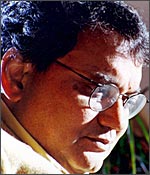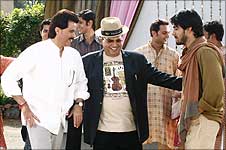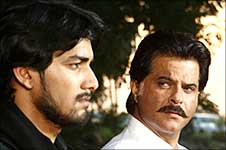|
|
| Help | |
| You are here: Rediff Home » India » Movies » Interviews » Subhash Ghai |
|
 Subhash Ghai | ||
| |||||||||||||||||||||||
|
| |||||||||||||||||||||||
They call him the Bollywood Showman.
Subhash Ghai [Images] has churned out blockbusters for decades, but this Friday sees the director working in relatively low-key mode with his latest film, Black & White, a small budget film starring newcomers.
In a two-part interview with Syed Firdaus Ashraf, the veteran director talks about his new film, the debacle of Kisna, and why Bollywood needs writers more than ever.
The Subhash Ghai brand stands for big-budget blockbusters. What made you choose a small film like Black & White?
Till today, the number of films I made had stories that demanded that they should be made on a grand scale. The characters should be larger than life. When the Black & White subject came to me -- after getting Whistling Woods up and running -- a thought came to me that I have always made grand-scale films. I asked myself, don't I need to make an issue-based film for the larger interest of society? I mean, meaningful cinema. Songs and dances are fine but this subject in Black & White touched me. It is a very dramatic, serious story. This story disturbed me and haunted me, and therefore I made this as a real story, not the film of a showman. It was difficult for me because I have always worked on a grand scale. Here, I have tried to be very honest, away from fiction and fantasy.
Two of your earlier films -- Karma and Khalnayak -- were also about terrorism. How different would you say Black & White is from them?
Those are fantasy films. They have colour in them. But you cannot put colour in a film like Black & White. Even if you do, you have to be very careful. For example, in a film like Taare Zameen Par [Images], you cannot put an item song. You see TZP, where you find that the story is more important than Aamir Khan [Images], therefore he came just before the interval. The film was made with honesty, and therefore, it ran well.
In the same way, Black & White is an honest film. There was the need to control temptations, and I am happy to say Black & White has emerged as the same film that I wanted to make when I started working on it.
How would you differentiate Black & White from other films about terrorism?
This can only be decided after audiences see the film.
Having said that, I would say this subject is very sensitive. A terrorist is also a human being. And while human beings are frightened to fall in a ditch or even be pierced by a pin, these terrorists are ready to blow themselves up into pieces. So the thinking of the fundamentalist is different. They call themselves fidayeen, while we call them terrorists.
The issue is not of fidayeen and terrorist, but why the issue exists in the first place. How should it be thrown out of society? When you look at the news on television, you see innocent people dying. It's not even war, but how can innocent people be killed? These people don't even known the names of the ministers but still die in bomb blasts. So I've tried to make a film where the Black meets the White, discuss this issue, and you come to know the reality.
Do you think there is no dialogue between civil society and terrorists?
Yes, there is no dialogue. We have to educate these terrorists. If you see, politicians rule and sepoys and jawans die. Leaders are  always above 50 years of age. So I want to say that life is not just black and white but has many other shades of colour and grey.
always above 50 years of age. So I want to say that life is not just black and white but has many other shades of colour and grey.
Have you named any terrorist outfits?
No, this is a fictional story. No man wants to become evil. He becomes evil because of circumstances and this is what I said in Khalnayak. I feel every human being is a beautiful person if you just try and look into his soul. You have to know how to diagnose these terrorists and cure them.
During your research for the film, did you come across any particular terrorist's story, someone who faced injustice and then turned to terrorism?
I did research of various groups. Be it Taliban, Hamas or anyone. I studied everyone and found out that the problem is same -- it's in their thinking. Moreover, if you study them, you will find that they come from very poor countries. They have destroyed their own economy and own growth. There is a lack of enlightenment and education.
So the terrorist in your film is not from
He is born and groomed from childhood with a different thought. He does not know any colour except black.
Does this mean an Islamic madrasa?
No, leave that issue. Look at how we treat each other in our own country. Sometimes, vegetarians do not tolerate non-vegetarians. Look at our castes -- one is a Thakur and another is from a lower caste. I feel no one has the right to hate anybody or any culture.
 Are you not afraid of controversy, making a film about Islam and terrorism?
Are you not afraid of controversy, making a film about Islam and terrorism?
It is not about that; it is about human love. It relates to Hinduism, Sikhism and secularism. It conveys what democracy means.
Your wife is a Muslim and you are a Hindu. It must have been easy for you to relate to the difference, personally.
Yes, my wife is a Muslim and I am a Hindu. My forefathers are from
Can you define your perception about Islam?
Islam is a great religion. It is the second biggest religion in the world and within a short span of time, it has influenced the human civilisation. I respect every religion. My point is not religion; my point is about people. Why are you fighting? Let us respect each other. Let us co-exist. If you read the Bible, Koran or Bhagwat Gita, you will find that the message is the same. All the principles are the same: human peace, love and existence. It is only some politicians who misinterpret this to divide people.
|
|
| © 2008 Rediff.com India Limited. All Rights Reserved. Disclaimer | Feedback |